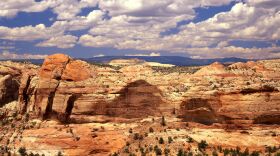At least five tribes including the Hopi and Navajo are among more than a dozen groups suing President Trump over his decision to reduce the size of Bears Ears and Grand Staircase-Escalante National Monuments in Utah. KNAU’s Justin Regan reports, the legal argument is over whether or not the president has the authority to shrink a monument.
President Trump argues in his declaration to shrink Bears Ears and Escalante that the Antiquities Act of 1906 requires the smallest area possible to protect a site. Presidents have reduced monuments in the past, though not as much as Trump’s plan. He proposes shrinking Bears Ears by 85 percent and Escalante by about half its size. Opponents say a president can only designate a monument and it’s up to Congress to reduce it.
"Congress clarified that in a 1976 law, the Federal Lands Management Act, which does have an express provision saying the Secretary of Interior cannot modify or revoke any national monuments,” says Kirsten Engel, a law professor at the University of Arizona.
No monuments have been reduced since that act passed. Engel also says there’s never been a Supreme Court case on the issue. So it’s new legal territory.






